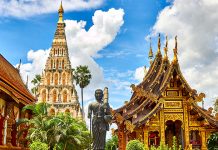Welcome Thomas and Zagorka!
Where are you from?
Thomas: Germany
Zaga: Montenegro
Where do you currently live?
Thomas: Montenegro but we also have an apartment in Germany
How many different houses have you lived in since you’ve been together?
Thomas: three (two in Montenegro and one in Germany)
How did you meet?
Thomas: Work. We (my company) were carrying out a workshop at a bank in Montenegro and Zaga was one of the participants. We went on our first date as soon as possible after the workshop but I was sure to get in touch with her before I left the country. It was attraction at first site.
Ages of children and where were they each born:
Katarina is three. She was born in Germany but the family returned to Montenegro one month after her birth.
Philip is six months, born in Montenegro.
Maya (Thomas’s daughter) is 16
What language(s) do you speak together?
Thomas: English 60% of the time and Serbian 40%. It depends on who is there. Since we had Katarina we avoid talking in English in front of her to avoid confusing her and we talk more in Serbian.
What languages do you speak to your child?
Thomas: I speak 95% in German (and 5% in Serbian) and Zaga speaks in Serbian.
What language does your child communicate in?
Thomas: She speaks Serbian 95% of the time and German 5%.
What religion is your family?
Thomas: Catholic
Zaga: Orthodox Christian
Thomas and Zaga: Our daughter is not baptized and will not be but she is Christian. We have no church orientation. Christmas is Christmas and Easter is Easter. We celebrate major holidays but we celebrate two Christmas’ and two Easters (the orthodox and non-orthodox).
What have been your major challenges as an intercultural family?
Thomas: To bridge the cultural differences.
Zaga: How to fit both your opinion and your husband’s into raising children.
What do you think your largest cultural difference is?
Thomas: I’m more individualistic and Zaga is more into her family network. I think that’s cultural as German society is more individualistic today and Serbian society is still more traditional in the sense of the role of family.
Also, there is a difference in the way of raising children. Serbian society tends to protect children more. What I mean by that is for example, they take a screwdriver away from a kid who is playing with it because the kid can poke their eye out. My approach would be, after a certain age of course, to let them play with it and figure out how it works. In Montenegro, even kids as old as seven or eight would be told not to play with this or that.
Zaga: Within the extended family context, in my culture it is more frequent and regular to see each other than in Germany. In Germany, they are Christmas to Christmas. We are extreme in the other direction, we are maybe exaggerating. The right measure may be somewhere in between.
What have been your greatest joys as an intercultural family?
Thomas: Also that, to live that difference. I learned from my mother-in-law how to produce wine. But I brought in a new step, to put the wine in the barrel in the bottle. I learned that from Italy. You take it out of the barrel and put it into the bottle so it doesn’t spoil. Nobody does that in Montenegro. When we married, a colleague gave me that machine as a present. I introduced that step as a wider process in the whole family and tradition of wine-making.
One of her cousins is a carpenter and you order furniture as you want it. You design it and build it which describes the difference of the way of living in Germany and the way of living down there. You go to Ikea in Germany, the furniture store or you buy fancy Italian stuff. You don’t go to a carpenter. I like the way of living there.
Zaga: The differences create opportunities to create and use things I otherwise wouldn’t. For example living in two places and to somehow enjoy advantages of both places, combining what is good on both sides and avoiding what is not, you are allowed to do more things. I wouldn’t say one place has an advantage over another but there are combinations of things that make it even better. You can combine and use all the advantages.
Thank you Thomas and Zaga!


































[…] Link: Real Intercultural Families: Thomas and Zagorka | InCultureParent […]